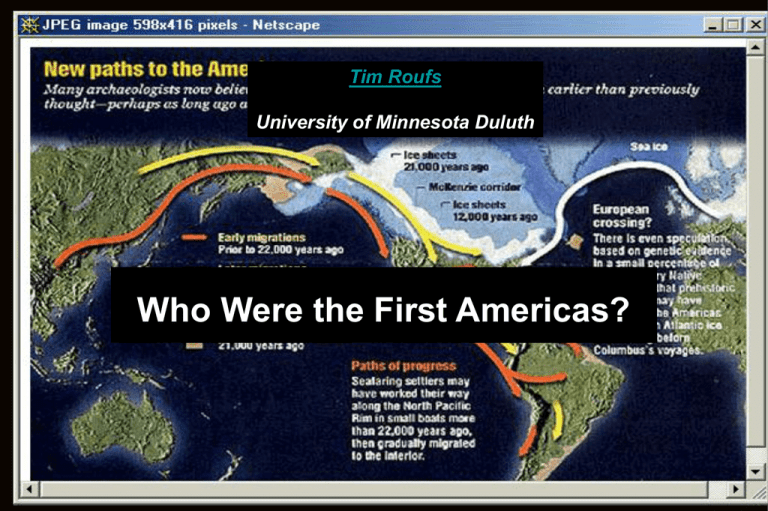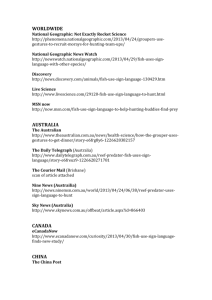Who Were the First Americas? Tim Roufs University of Minnesota Duluth
advertisement

Tim Roufs University of Minnesota Duluth Who Were the First Americas? Who Were the First Americas? The classic explanation . . . Main Routes of Migration through the New World www.odci.gov/cia/publications/factbook/reference_maps/north_america.html Miocene-Pliocene Routes of Animal Migrations More recent explanations . . . The latest announced discovery . . . “Eva de Naharon” http://news.nationalgeographic.com/news/2008/09/080903-oldest-skeletons.html?source=rss http://news.nationalgeographic.com/news/2008/09/080903-oldest-skeletons.html?source=rss Tulum www.d.umn.edu/cla/faculty/troufs/anth1095/Yucatan.html#title www.d.umn.edu/cla/faculty/troufs/anth1095/Yucatan.html#title www.d.umn.edu/cla/faculty/troufs/anth1095/Yucatan.html#title http://news.nationalgeographic.com/news/2008/09/080903-oldest-skeletons.html?source=rss http://news.nationalgeographic.com/news/2008/09/080903-oldest-skeletons.html?source=rss Any hypothesis/theory must account for . . . Cf., Text: Mexico, 2008, p. 20 http://news.nationalgeographic.com/news/2008/09/080903-oldest-skeletons.html?source=rss www.unl.edu/rhames/monte_verde/monte_verde_map.gif www.learnnc.org/lp/media/uploads/2008/02/monte_verde_chile.jpg http://news.nationalgeographic.com/news/bigphotos/15550150.html www.nationalgeographic.com/events/97/monteverde/dallas.html Any hypothesis/theory must account for . . . http://news.nationalgeographic.com/news/2008/09/080903-oldest-skeletons.html?source=rss http://news.nationalgeographic.com/news/2008/04/080403-first-americans.html This coprolite, or fossilized chunk of feces, was found in Oregon's Paisley 5 Mile Point Caves. Scientists have dated the remains to 14,300 years ago—the oldest evidence yet found of humans in North America. http://news.nationalgeographic.com/news/bigphotos/96254452.html Other discoveries . . . theories . . . hypotheses . . . http://news.nationalgeographic.com/news/2008/09/080903-oldest-skeletons.html?source=rss www.reuters.com/article/scienceNews/idUSN1224486120080213 www.sciencedaily.com/releases/2008/02/080213090524.htm http://dsc.discovery.com/news/2007/11/27/native-america-siberia.html The University of Michigan study, which analyzed genetic data from 29 Native American populations, suggests a Siberian origin is much more likely than a South Asian or Polynesian origin. www.eurekalert.org/pub_releases/2007-11/uomh-gss112607.php http://news.nationalgeographic.com/news/2007/02/070223-first-americans.html http://news.nationalgeographic.com/news/2007/02/070223-first-americans.html Clovis Folsom Plano Dalton Major types of North American Paleo-Indian projectile points. Understanding Physical Anthropology and Archaeology (8th ed), p. 386 10th Ed., p. 330, Ch. 13 “At a Glance” www.ele.net/art_folsom/preclvis.htm www.ele.net/art_folsom/pre-clovis_2004/preclovis2004.htm “pre-Clovis” 11,500 - 14,000 ybp http://news.nationalgeographic.com/news/2007/02/070202-human-migration.html http://news.nationalgeographic.com/news/2006/10/061017-bering.html www.pbs.org/saf/1406/ www.netowne.com/historical/archeology/oldest.htm http://news.bbc.co.uk/2/hi/americas/319700.stm http://msnbc.msn.com/id/5955043/ http://msnbc.msn.com/id/5955043/ http://msnbc.msn.com/id/5955043/ http://msnbc.msn.com/id/5955043/ www.duluthsuperior.com/mld/duluthtribune/news/nation/10212243.htm www.duluthsuperior.com/mld/duluthtribune/news/nation/10212243.htm www.duluthsuperior.com/mld/duluthtribune/news/nation/10212243.htm www.duluthsuperior.com/mld/duluthtribune/news/nation/10212243.htm www.pbs.org/saf/1406/ www.d.umn.edu/cla/faculty/troufs/anth3618/video/Coming_to_America.html#title Misc . . . http://dsc.discovery.com/news/briefs/20030728/american.html http://deseretnews.com/dn/print/1,1442,595095698,00.html Earliest Known Minnesotan Earliest Known Minnesotan “The Minnesota Man” (who was really a woman) (and was renamed officially by the Minnesota Legislature as “Minnesota Minnie”) A contemporary . . . “The Tepexpán Man” (who was also really a woman) Tepexpán www.ancientmexico.com/ Tequixquiac Tepexpan / St. Isabel Istapan Penon Woman Hueyatlaco Toloquilla Tepexpán “Man” Tepexpán “Man” Main Routes of Migration through the New World The earliest known “art”? . . . Tequixquiac Coe and Koontz, Mexico: From the Olmecs to the Aztecs, 6th ed., 2008, p. 23 The "Sacro de Tequixquiac“ (Canino Bone), considered as the oldest artistic creation of the American continent, on display in the exhibition “America Migrante” (Migrant America) during the Universal Forum of Cultures Monterrey 2007, in Monterrey, Mexico, 06 October 2007 www.daylife.com/photo/0ebAfTY165dB2 Tequixquiac Tepexpan / St. Isabel Istapan Penon Woman Hueyatlaco Toloquilla www.duluthsuperior.com/mld/duluthtribune/news/nation/9465209.htm www.duluthsuperior.com/mld/duluthtribune/news/nation/10212243.htm www.d.umn.edu/cla/faculty/troufs/anth1602/pckennewick.html#title What will the future past reveal? 2008 www.nerc.ac.uk/research/programmes/efched/results/gonzalez.asp Coe and Koontz, Mexico: From the Olmecs to the Aztecs, 6th ed., 2008, p. 236 www.d.umn.edu/cla/faculty/troufs/anth3618/mastages_handout.html www.d.umn.edu/cla/faculty/troufs/anth3618/mastages_handout.html




